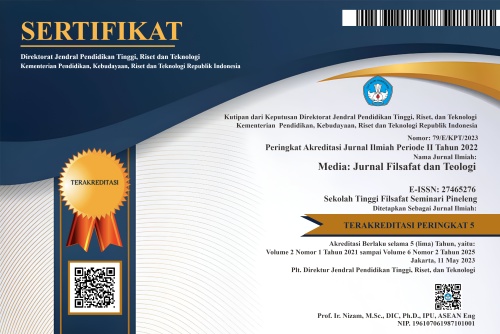Relevansi Hukum Kodrat Stoa terhadap Disrupsi Kecerdasan Buatan
DOI:
https://doi.org/10.53396/media.v5i1.191Keywords:
Nature, Stoics, Artificial Intelegence, Reason, ConsciensceAbstract
Artificial intelligence begins to be treated as a conscious entity; it can feel guilty, and provide improvements for more perfect results in the future. I raises the important question: is human life still secure? This article discusses the relevance of Stoic natural law in regard with the disruption of artificial intelligence. This research was designed as a literature review. In the midst of the progress of artificial intelligence, this article aims to discuss human nature from the perspective of Stoicism's human philosophical thought, especially one of nature. The Stoics were one of the academic schools in the Hellenistic era that specifically paid attention to the concept of nature. The core of their moral teachings is found in the imperative "live according to nature". Stoic teachings about nature can be achieved by being a true human being, and choosing the right things in certain situations. By understanding the human nature, the disruption of the era of artificial intelligence does not need to be feared excessively. Human being is based on their conscience, an internal force that will direct them to choose what is morally good and not vice versa. An inner voice will never be possessed by artificial intelligence.
References
Bertens, Kees. Sejarah Filsafat Yunani. Yogyakarta: Kanisius, 1999.
Cicero. De Officiis. Edited by T.E. Page Litt. London: William Heinemann Ltd, 1968.
———. On Moral Ends. Edited by Jullia Annas. Cambridge: Cambridge University Press, n.d.
———. On the Laws. Ithaca and London: Cornell University Press, 2014.
———. On the Republic. Ithaca and London: Cornell University Press, n.d.
Crowe, Michael Bertram. The Changing Profile of Natural Law. The Hague: Martinus Nijhoff, 1997.
Harari, Yuval Noah. Sapiens: A Brief History of Humankind. UK: Penguin Random House, 2014.
Hillemann, Dennis. “Do We Need to Teach Our Artificial Intelligence How to Feel Regret?” Medium, 2023. https://dhillemann.medium.com/do-we-need-to-teach-our-artificial-intelligence-how-to-feel-regret-e4baf6cd1698.
Jacobs, Jonathan A., ed. Reason, Religion and Natural Law: From Plato to Spinoza. USA: Oxford University Press, 2012.
Laertius, Diogenes. Lives of the Eminent Philosophers. Edited by James Miller. Oxford: Oxford University Press, 2018.
Metz, Cade. “The Godfather of A.I. Has Some Regrets?” New York Times, 2023. https://www.nytimes.com/2023/05/30/podcasts/the-daily/chatgpt-hinton-ai.html?showTranscript=1.
Pötter, Klian. “What It Means to Be Human: Blade Runner 2049.” Philosophy Now, 2023.
Sedley, A. A. Long and D. N. The Hellenistic Philosophers. Cambridge: Cambridge University Press, 1987.
Suleyman, Ian Bremmer and Mustafa. “The AI Power Paradox.” Foreign Affairs, 2023.
Theo, Yohanes. Filosofi Untuk Hidup Yang Layak A’la Stoa. Yogyakarta: Cantrik Pustaka, 2021.
Tom, Angier, ed. The Cambridge Companion to Natural Law Ethics. Cambridge: Cambridge University Press, 2019.
Downloads
Published
How to Cite
Issue
Section
License
Copyright (c) 2024 Yohanes Theo

This work is licensed under a Creative Commons Attribution 4.0 International License.













